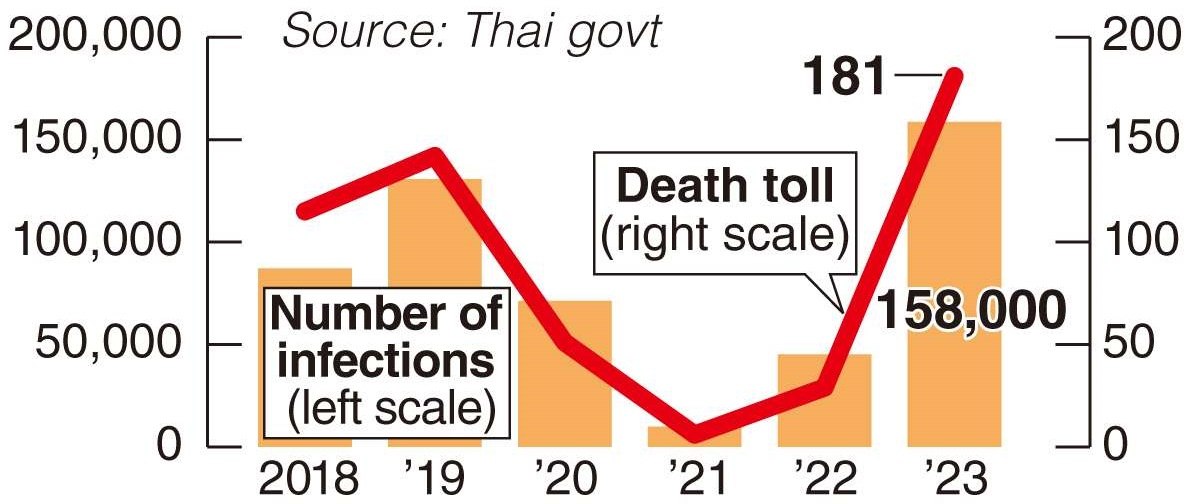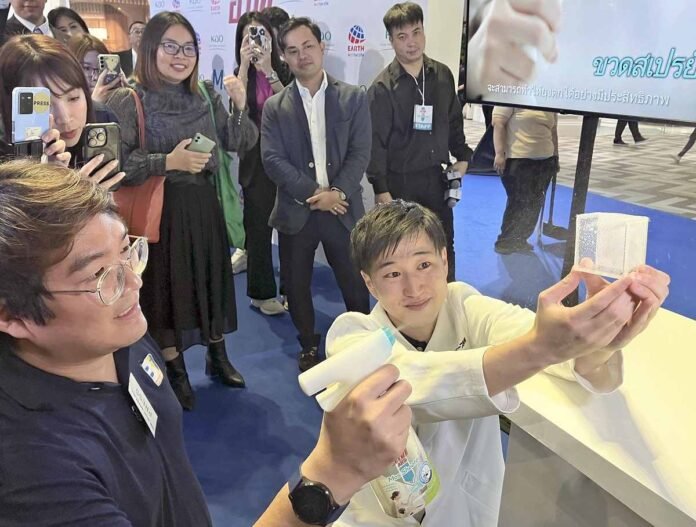A demonstration of a mosquito repellent developed by Kao Corp. will be held in Bangkok in early May. and Earth Corp.
17:54 JST, May 26, 2024
BANGKOK – Japanese pharmaceutical makers and other companies have launched pesticides, vaccines and other products to help in the fight against dengue fever, which is rampant in Southeast Asia and South America.
Their efforts can be partly attributed to the increasingly serious situation on the ground, with the number of dengue fever infections worldwide set to reach an all-time high by 2023. In countries where the disease has spread, expectations are rising for Japanese products, research and development projects.
Dengue fever is an infectious disease transmitted by mosquitoes such as the dengue mosquito. The disease mainly occurs in tropical and subtropical areas. People get the disease when they are bitten by a mosquito that carries the virus. There is no effective medicine to treat the disease. Symptoms, including fever and headache, occur three to seven days after infection. A severe case can result in death.
In Japan, 175 people were reportedly infected with the disease abroad in 2023 and developed symptoms after returning to Japan. The Ministry of Health, Labor and Welfare has issued warnings about the disease to people traveling to Southeast Asia and other regions.
Kao Corp. and Earth Corp. will be selling ARS Mos Shooter, a mosquito repellent spray jointly developed in Thailand, in July. The new product prevents mosquitoes from flying by coating them with an active interfacial agent that mixes water and oil.
According to the companies, the spray is not only free of chemically synthesized substances, but is even effective against pesticide-resistant mosquitoes. The companies are also considering selling the product in Vietnam and Malaysia.
Takeda Pharmaceutical Co. has shipped 3.6 million shots of a dengue vaccine in 2023. The shots were administered in Thailand, Indonesia, Brazil and other countries.
The company partnered with Biological E. Ltd., an Indian pharmaceutical manufacturer, in February. Under the partnership, the company plans to increase its vaccine delivery capacity to 100 million shots per year by 2030, equivalent to supplying 50 million people.
Fujifilm Corp. has been selling antigen test kits, which can detect the dengue fever virus, to medical institutions in Thailand and the Philippines since summer last year. The kits can determine whether a person is infected with the disease, even if they are carrying only a small amount of the virus.
According to the World Health Organization, the number of dengue fever infections in 2023 was more than 6.5 million, the highest ever. The death toll from or related to the disease exceeded 7,300. Currently, the disease is widespread in more than 100 countries and 70% of infections are concentrated in Asia.

Rapid rise in dengue infections and death toll in Thailand following COVID-19 pandemic
According to the Thai government, dengue fever infections will quadruple in 2023 and the death toll will increase sixfold from the previous year. The increases were believed to be driven by factors such as the expansion of mosquito habitats, due to global warming and urbanization, and increased human activity following COVID-19.
The Thai government is making concentrated efforts to eliminate mosquitoes and implement other disease prevention measures.
Chantana Padungtod, head of the Bureau of Occupational and Environmental Health at Thailand’s Department of Disease Control, said that while combating dengue fever is a Herculean task for public health and sanitation officials, the disease can be prevented. The knowledge gained from Japanese pharmaceutical manufacturers is likely to be increasingly exploited.
The increase in inbound tourism to Japan poses an increasing risk that infectious diseases originating overseas could spread within the country. In the future, it will be necessary to promote measures related to infectious diseases, including treatments.



